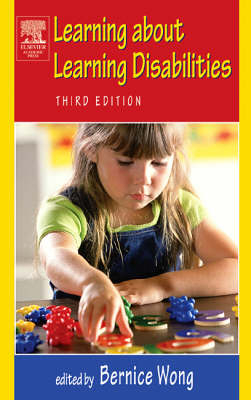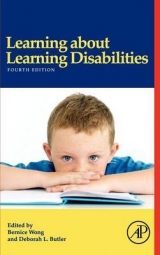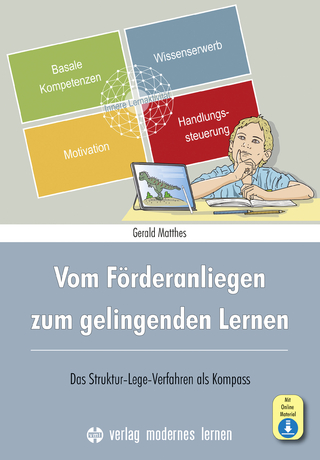
Learning About Learning Disabilities
Academic Press Inc (Verlag)
978-0-12-762533-1 (ISBN)
- Titel erscheint in neuer Auflage
- Artikel merken
Bernice Wong's Learning about Learning Disabilities was the first text to give equal attention to the intellectual, conceptual, and practical aspects of learning disabilities. The Third Edition of this popular title presents 80% new material, keeping the chapters up to date in this fast-moving field. With new contributors, and seven new chapters, coverage is both comprehensive and thorough, with three sections encompassing the research aspects of learning disabilities, the instructional aspects of learning disabilities, and the issues germane to different age ranges of the learning disabled: children, adolescents, and adults.
Chapters summarizing research on learning disabilities include coverage of ADHD, memory, language processing, social competence, self-regulation, and brain structures as they apply to learning disabilities. Chapters focusing on instructional aspects of learning disabilities include coverage of teaching literacy, reading comprehension, writing, and mathematics.
Readers will find Learning About Learning Disabilities, Third edition suitable for use as a reference source for researchers or a graduate level text.
Reviews from previous editions:
"An undergraduate text that strikes a careful balance between the intellectual (psychological) and practical aspects of learning disabilities."
—BOOK NEWS, INC.
"This text provides a balanced focus on both the conceptual and practical aspects of learning disabilities. Its research coverage is more comprehensive and of greater depth than any other LD textbook, and it is distinctive in its treatment of such important areas as consultation skills and service delivery."
—CHILD ASSESSMENT NEWS
"Learning About Learning Disabilities provides a broad overview of some important issues in relation to the education and development of pupils with learning disabilities... Wong has succeeded in providing detailed descriptions and comments within a book which covers a broad range of topics. Without exception the chapters are clearly written and accessible, and many provide the reader with challenging ideas and practical suggestions."
—BRITISH JOURNAL OF SPECIAL EDUCATION
Bernice Wong is Professor Emeritus at Simon Fraser University, Burnaby, British Columbia. Prior to retirement, her passion had been writing intervention research with students with and without learning disabilities. In retirement, her love for writing has transformed from academic writing to short stories about interesting events in her life.
Contributors
Preface
Acknowledgments
To the Student
Section I: Conceptual, Historical, and Research Aspects of Learning Disabilities
Chapter 1. Learning Disabilities: An Historical and Conceptual Overview
I. Current Status of the Field
II. A Historical Perspective
III. Current and Future Issues
IV. Concluding Comments
Chapter 2. Learning Disabilities and Memory
I. Introduction
II. A Historical Perspective
III. Contemporary Research
IV. Parallels to Normal Memory Development
V. Components and Stages of Information Processing
VI. Memory Research in Perspective
VII. Trends in Memory Research
VIII. Implications from Contemporary Memory Research for Instruction
IX. Summary and Conclusion
Chapter 3. Language Processes and Reading Disabilities
I. Introduction
II. Theoretical Approaches to Language Acquisition
III. Language and Reading
IV. Language, Word Recognition, and Reading Disabilities
V. Sources of Individual Differences
VI. Language, Reading Comprehension and Reading Disabilities
VII. Future Challenges
Chapter 4. Peer Relationships and Learning Disabilities
I. Introduction
II. What Are the Characteristics of Peer Relationships of Students with Learning Disabilities?
III. What Factors Might Be Linked to the Peer Relationships of Students with Learning Disabilities?
IV. Future Research Directions
Chapter 5. Self-Regulation among Students with LD and ADHD
I. Defining and Understanding Self-Regulation
II. Theoretical Bases for Research on Self-Regulation
III. Common Self-Regulation Processes: Application with Students with LD and ADHD
IV. Self-Regulation and Major Dependent Variables
V. Factors Influencing and Influenced by Self-Regulation
VI. Self-Regulation of Strategic Performance
VII. Conclusion
Chapter 6. The Reading Brain in Children and Youth: A Systems Approach
I. Brain as a Functional System
II. Important Processes in the Reading Brain
III. Imaging Studies of Children and Youth With and Without Reading Disabilities
IV. Implications for Assessment and Instructional Intervention
Section II: Instructional Aspects of Learning Disabilities
Chapter 7. Difficulties in Reading Comprehension for Students with Learning Disabilities
I. Introduction
II. Students' Difficulties in Reading Comprehension
III. Effective Reading Comprehension Instruction
IV. Future Directions
Chapter 8. Writing Instruction
Introduction
I. Writing is Critical to Children's Success in School and Beyond
II. What Are the Ingredients Involved in Learning to Write
III. The Writing of Students with LD
IV. Principles of Writing Instruction
V. Concluding Comments
Chapter 9. Instructional Interventions in Mathematics for Students with Learning Disabilities
I. Introduction
II. Learning Disabilities and Mathematics Achievement
III. Instruction Referenced to NCTM Standards
IV. Interventions on Computation Skills
V. Cognitive Strategy Instruction
VI. Use of Manipulatives
VII. Studies Involving Peer Mediation
VIII. Discussion
Chapter 10. Social Competence/Social Skills of Students with Learning Disabilities: Interventions and Issues
I. Scope and Objectives
II. Overview of Social Competence/Social Skills
III. Instructional Method
IV. Issues
V. Future Directions for Social Skills Intervention Research
VI. Summary
Chapter 11. Strategic Academic Interventions for Adolescents with Learning Disabilities
I. Introduction
II. Empowerment Strategies for Academic Success and Independence
III. Strategic Instructional Practices
IV. Teaching High-Impact Strategies
V. Conclusion
Chapter 12. Social Competence of Adolescents with Learning Disabilities: Interventions and Issues
I. Introduction
II. Review of Descriptive Studies of Social Competence of Adolescents with LD
III. Review of Intervention Research to Enhance Social Competence of Adolescents with LD
IV. Informing the Search for Alternative Approaches
V. Implications for Practice and Research on Social Competence Interventions
VI. Summary and Conclusion
Chapter 13. The Science of Schooling for Students with Learning Disabilities: Recommendations for Service Delivery Linking Practice with Research
I. Science and Schooling for Students with LD
II. Identifying Effective Instruction for Students with LD
III. Are Students with LD Receiving Specialized Instruction Designed to be Effective?
IV. Recommendations for Service Delivery That Links Practice with Research
Chapter 14. A Community of Practice: Implications for Learning Disabilities
I. Setting the Stage: Teaching in Contemporary Inclusive Schools
II. Constituting an Educational Community of Practice
III. Guided Inquiry supporting Multiple Literacies (GIsML)
IV. Conducting Case Studies of Included Students in GIsML Instruction
V. Constructing and Analyzing the Case Studies
VI. Linking Teacher Learning and Student Learning
VII. The Teachers' Reflections
VIII. Conclusion
Appendix 1: Vignettes from Evan's Experience with the Light Program of Study
Section III: A Lifespan Approach to Understanding Learning Disabilities
Chapter 15. Learning Dis/ability as the Intersection of Competing Discourses: Implications for Classrooms, Parents, and Research
I. Introduction
II. Discursive Practices of Dis/Ability
III. Implications for the Classroom
IV. Implications for Parents (Caregivers)
V. Implications for Research
VI. Conclusions
Chapter 16. Adolescents with Learning Disabilities: Revisiting The Educator's Enigma
I. Introduction
II. Historical Context
III. How Research Has Informed Practice
IV. Future Research
V. Conclusion
Chapter 17. Adults with Learning Disabilities
I. Introduction
II. Refocusing on Adults with LD: An Historical Overview
III. LD from a Lifespan Perspective
IV. Challenges Facing Adults with LD
V. Accounting for Individual Differences
VI. Programs and Interventions
VII. Reflection: Progress and Future Directions
Chapter 18. Understanding Learning Disabilities through a Father's Perspective
Christine Greenhaw Mashburn Institute, 2000
Index
| Erscheint lt. Verlag | 21.9.2004 |
|---|---|
| Verlagsort | San Diego |
| Sprache | englisch |
| Maße | 152 x 229 mm |
| Gewicht | 980 g |
| Themenwelt | Sozialwissenschaften ► Pädagogik ► Sonder-, Heil- und Förderpädagogik |
| ISBN-10 | 0-12-762533-X / 012762533X |
| ISBN-13 | 978-0-12-762533-1 / 9780127625331 |
| Zustand | Neuware |
| Haben Sie eine Frage zum Produkt? |
aus dem Bereich



